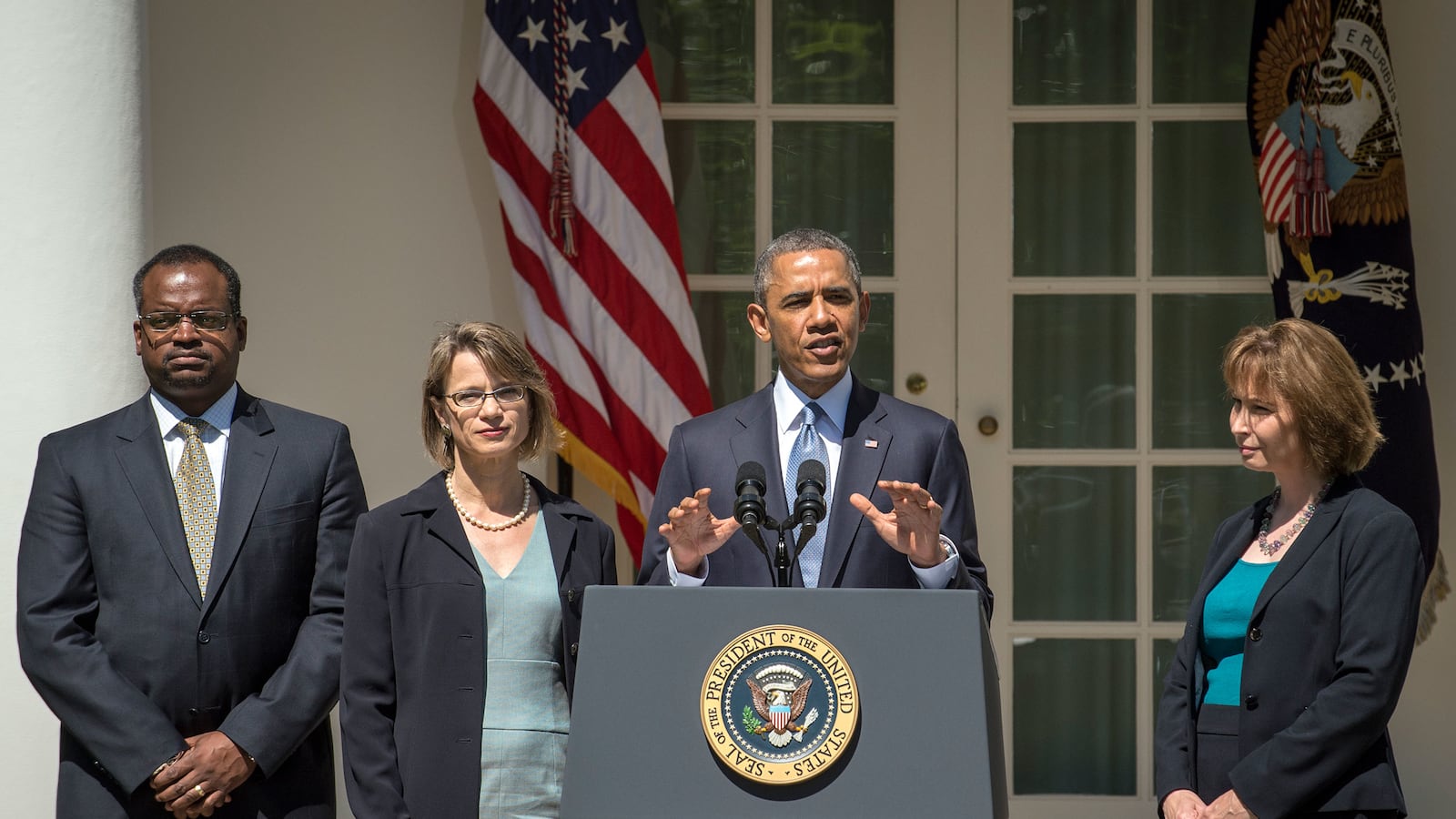With Donald Trump’s cabinet picks gearing up for Senate confirmation hearings, Senate Minority Leader Chuck Schumer admitted last week that he wishes Democrats had not effectively blown up the filibuster in 2013, and along with it, any real chance his party might have had to block any of Trump’s cabinet picks today.
But there is a silver lining for liberals.
Because behind the 2013 decision to use the nuclear option and change the filibuster rules lies in the result they got at the time—three Obama appointees to the D.C. Circuit, formally known as the U.S. Court of Appeals District of Columbia Circuit. As the court that hears the majority of challenges to the regulations of federal agencies, the D.C. Circuit will likely be the final word on many of the challenges to Obama administration policies from the past and Trump administration policies in the future.
To legal experts, that makes the D.C. Circuit the second most important court in the country, just behind the Supreme Court. For many Democrats, that was a hill that was worth dying on.
“Do we wish the filibuster was still in place? Yes,” a senior Democratic aide said. “But we got a lot of federal judges through, including the three on the D.C. Circuit, and that’s huge.”
After seven years without filling a vacancy on the D.C. Circuit, Obama saw four of his nominees approved by the Senate in rapid succession in 2013, including three whom Republicans were filibustering indefinitely. The additions of Patricia Millett, Nina Pillard, and Robert Wilkins, along with Judge Sri Srinavassan who had been confirmed earlier in the year, changed the composition of the D.C. Circuit from an even four-to-four split among Democratic and Republican appointees to a seven-to-four Democratic advantage.
“It does matter a great deal whether Democratic or Republican president have nominated the judges,” said Aaron Saiger, a professor at Fordham University's School of Law who clerked for D.C. Circuit Judge Douglas H. Ginsburg. “Getting those four judges on the D.C. Circuit was extremely important for the Obama administration.”
In addition to its outsized importance, Saiger said the D.C. Circuit has also included some of the most famous judges in the country among its ranks. Chief Justice John Roberts and Justices Clarence Thomas and Ruth Bader Ginsberg all sat on the court. So did Ken Starr, Antonin Scalia, and Warren Berger. And Judge Merrick Garland is back on the D.C. Circuit now that any hope of a Democratic presidential administration is off the table.
Not only has it produced famous judges, the D.C. Circuit has heard many high-profile cases, most recently a challenge to the Dakota Access Oil Pipeline against the U.S. Army Corps of Engineers, a pending challenge to contraceptive coverage for employees under Obamacare, and an argument from the state of West Virginia against the EPA over the Obama administration’s Clean Power Plan.
Elliot Mincberg, a Senior Fellow with People for the American Way, said that many of the current administration’s highest profile cases have been upheld since the Senate confirmed the three additional Obama nominees in 2013.
“There is no question that the Obama administration has done substantially better since he was able to appoint judges to the D.C. Circuit, including the ones that were broken through as a result of the nuclear option,” Mincberg said. “Certainly the en banc decisions (which included all 11 members of the court) have been progressive since the Democrats have held the majority.”
To Mincberg’s point, since 2013, the D.C. Circuit has upheld the Obama administration’s rules on FCC “net neutrality,” EPA’s climate change regulations, the individual insurance mandate under Obamacare and the constitutionality of President Obama’s executive actions on immigration. A different federal court struck down the same immigration measure, so the D.C. Circuit is not the only place for an agency review. But it remains the most likely place to hear a challenge to Obama regulations now and, crucially to Democrats, will become the most likely court to review challenges to Trump administration agency regulations in the future.
“The D.C. Circuit will continue to be extremely important under a Trump administration,” Mincberg said. “It could well be a check, just as they have sometimes been a check on Obama when they feel like he has done something improper.” Mincberg couldn’t say which Trump actions might be the most likely to get challenged in court, but it seems clear the D.C. Circuit will have more than enough work on its docket.
“There’s no question that if a President Trump does what Candidate Trump promised to do, there will be major challenges to administration rules and it’s likely there will be court challenges of one sort or another,” he said.
And many of those challenges with go through the D.C. Circuit, where the seven-to-four split, including four Obama appointees, makes some Democrats think the decision to use the nuclear option years ago might have been worth it in the end.





